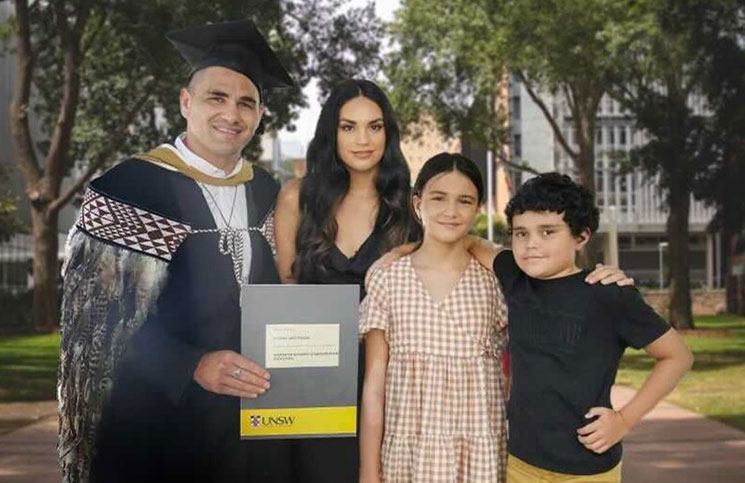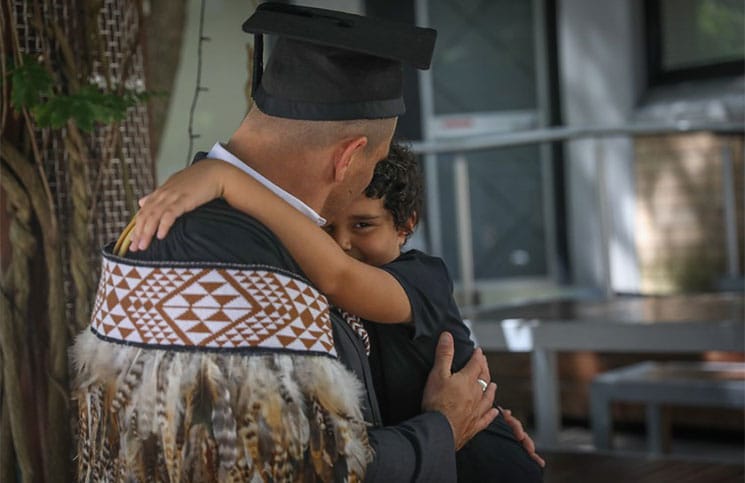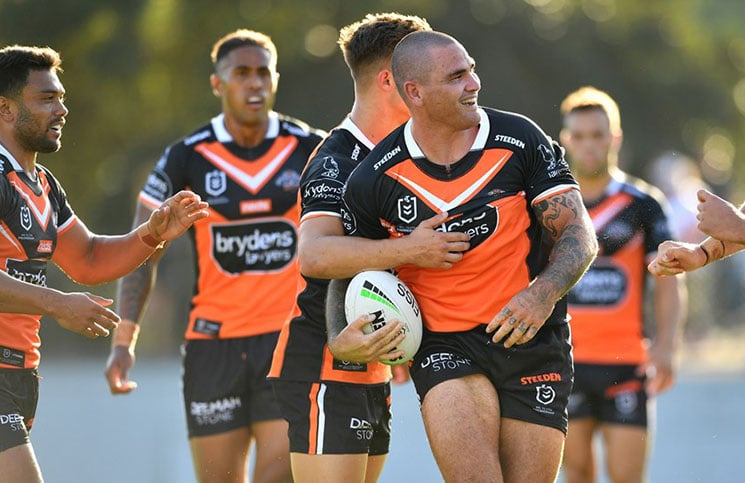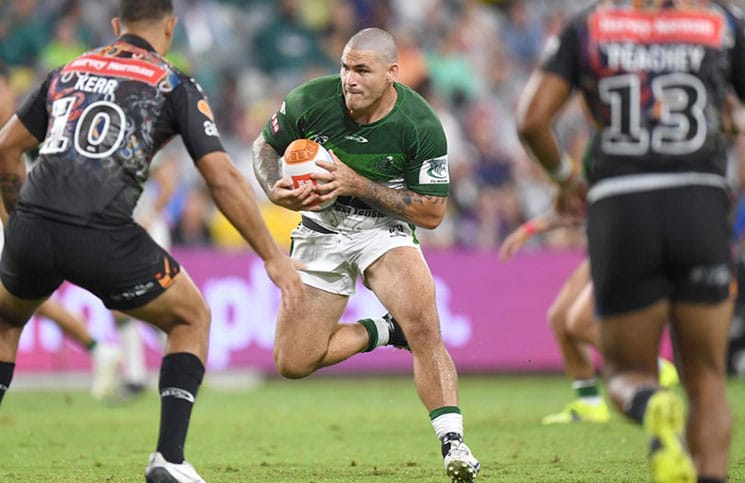By Troy Whitaker
NRL.com Reporter
“Life has taught me that I must embrace reality with a brutal honesty if I am to succeed in any domain.”
Those words, inspired by Brene Brown’s book Daring Greatly, were written by Russell Packer as he documented his life story in the final assessment of his Master of Business Administration (Executive).
It’s a sentiment the Wests Tigers prop has embodied since January 5, 2015 – the day he was freed after a year in jail for assault. Through two pillars – football and education – he has redefined himself.
“The ability to accept the pain and discomfort that comes with the truth is essential for any meaningful transformation,” he submitted.
Befitting the way he crashes into defences, Packer has confronted his errors head-on during his well-documented rehabilitation.

The New Zealander doesn’t shy away from talking about the alcohol, drugs, violence and brushes with the law that characterised his upbringing in the small country town of Foxton on the North Island.
But it’s now a far-removed past from which he has grown.
“I want the article to emphasise that there is no sugar-coating the fact that I have made mistakes, that I have been to jail,” he suggests at the end of a candid half-hour interview with NRL.com.
“But more importantly that I have accepted responsibility for my life.”
This is also a story about remarkable achievement and overcoming the odds.
Packer still loves playing rugby league, but the front-rower has qualifications akin to a CEO after completing his MBA last year at the University of NSW’s Australian Graduate School of Management (AGSM).

‘Education has the power to transform lives’
The 31-year-old, who didn’t finish high school because footy was his focus, has relentlessly studied for the past seven years.
While at St George Illawarra, the club that helped relaunch his career, he first undertook a Certificate IV in Community Services at TAFE.
That was followed by a Bachelor of Commerce (Accountancy and Finance) and a Graduate Certificate in Business at the University of Wollongong, before transferring to UNSW for his MBA.
He had to manage the disruption of mostly online classes alongside the other members of his graduate program, Cohort X, amid the COVID-19 pandemic last year.
Such is his love for learning, Packer is enrolled in a Master of Legal Studies (Corporate and Commercial) at the University of Auckland.
Social distancing protocols have caused indefinitely postponed graduation ceremonies, but Packer informally celebrated his latest accomplishment at UNSW on Monday with his proud partner, Lara Wilcox, and two children – son Marley and daughter Madison.
He donned an academic cap and gown as well as a traditional Korowai cloak; an item of great significance in Maori culture historically worn by chiefs and now used to signify milestones.

“When bad things happen in your life and you make a mistake, you need people who believe in you and believe that was a lapse in judgement and know that you are better than what you showed at that particular time,” the seven-time Kiwi representative says.
He gave thanks to “everyone at the Dragons”, to whom he feels “forever indebted”, including former coach Paul McGregor, ex-CEO Peter Doust and football operations manager Robert Finch.
Packer also considers Barry and Leisa Doherty life mentors.
“I’m just grateful that I have had the support of family and friends as well. Hopefully, they are proud of this accomplishment because when people take a chance on you, particularly when you have made mistakes, it always feels good to be able to repay them,” he continues.
“It was nice to get the opportunity to do a symbolic kind of graduation and, hopefully, we get to do a real one later this year.
Life has taught me that I must embrace reality with a brutal honesty if I am to succeed in any domain
Wests Tigers prop Russell Packer
“To come from [my past] and use education as the mechanism to build myself back up again, simultaneously with my rugby league career, it’s definitely different but it’s just as rewarding.
“I’ve always done well at school, but I guess when rugby league took priority in my life – I was around 16 years old when I signed my first professional contract – and being the kind of person I am, I went all-in on the rugby league bandwagon.”
After signing up for “a couple of courses” in his early days at the Warriors but dropping out because he was “not mature enough or I didn’t have the skillset to navigate what university is all about”, Packer has become a leader.
Wilcox adds: “Russell’s success will never be measured by this [MBA] certificate, instead his success will be measured by the struggles he encountered and had to overcome to be here today.
“He has always backed himself and never folded to others’ opinions and that’s what inspires us the most.
“His resilience and persistence is the reason he’s living the life he wants and he has never doubted his worth or value in the process.
“It’s a special day given the journey we’ve been on together as a family and it makes moments like this mean so much more.”

Russell Packer and son Marley.©weststigers.com.au
Professor Nick Wailes, director and deputy dean of the AGSM, says Packer epitomised the business school’s ultimate goal.
“Which is to equip people to ‘always be learning’,” he says.
“The best students are conscientious of course but more importantly, they are curious and want to apply their learning to solve problems and make a contribution.
“Learning never stops really and Russell shows no signs of slowing down, now undertaking a Master in Law.
“We believe education has the power to transform lives and we are delighted Russell chose to study at AGSM. While we do our best to create a world-class learning experience, the credit for Russell’s success belongs to him and his family.
“I fully expect him to be as successful in his post-playing career as he is on the field. We’re very proud of all his achievements and look forward to watching him continue to thrive in his career.”

Breaking barriers
With his imposing frame, NRL star profile and a past so readily available for strangers to judge, it would be easy to assume Packer has faced social stigma or prejudice in the classroom.
“I have got tattoos on my knuckles and on my hands, and I decided to get those when I was very young, but no – the universities that I have been to, the people have been very welcoming,” he says.
“I think one of the key things that I have really grown with, particularly at AGSM, is the community of people. You create a lot of really strong relationships and I think that is what a business school provides; that value of connectivity and the networks.”
Packer’s last MBA assessment was supposed to centre on a business transformation, but he asked the lecturer if he could instead write about his personal development in the past six years.
He shared with NRL.com the document in which he provided some jarringly honest, profound insights into his state of mind.
Following the 2013 fight that landed him in jail, Packer, who made his NRL debut aged 18, recalled thinking he would escape serious punishment, as had been the trend.
“I have become quite adept at compartmentalising the consequences of my actions,” he wrote in the assignment.
“I tell myself that it won’t end badly, that rugby league will save me again. I believe I am special, the normal rules do not apply to me.”
Having undergone cognitive therapy after jail to understand his behavioural issues stemming from a turbulent youth, Packer noted, “the signals of distress in retrospect were clear to see but I did not possess the maturity, support or a desire to take action”.

Using his “twin pillars” of rugby league and education, Packer has broken away from the tendencies that once plagued him.
“A true transformation requires destruction; of oneself, an image, an ego, of habits, or a successful business,” he wrote.
“A shedding of old constructs is required in order to transform something that is into something that has never been; like a carver who starts with a piece of stone and bit by bit chips away until the vision in his mind is clear for all to see.”

Inspiring the youth and life after footy
If someone is guided by his tale, Packer would deem that a “win”.
While he doesn’t want to preach, the Tigers enforcer is happy to be an example of what is possible with dedication and has spoken to the next generation at NRL Rookie Camps.
“It’s my hope that my story can inspire people that maybe have done the wrong thing like myself to take ownership of their life,” he says.
“Another thing going to the Rookie Camp is a lot of people that play in the NRL come from broken families and situations where they experience things that they think are normal, but are not actually normal in terms of how society views it.
“So I think touching people like that there is another way [to connect], and the thing with education is you have to want to do it like myself.”
NRL senior wellbeing and education manager Paul Heptonstall says Packer’s work at Rookie Camps was highly valued.
“Russell’s a great example of a player who acknowledges that doing something other than football makes his wellbeing so much better,” Heptonstall says.
“I think with the struggles that he had, he realised and made the most of all the resources to him through the club careers, coaching, through education grants.
“But most importantly, he embraced it himself. And that’s one of the biggest challenges, getting players to see the importance of it.
“But because he was at rock-bottom, he fully committed himself to educating himself.

“Since he’s started his education, he’s inspired a lot of other younger players to do exactly the same, to engage in education and career development.”
In an age where he believes young players can be pushed towards extracurricular pursuits “because it looks good”, Packer encouraged them to determine their passions and go from there.
“Universities are just one way of educating yourself. There are so many other things that you can do,” he says.
Because he was at rock-bottom, he fully committed himself to educating himself.
Paul Heptonstall
“When I have had some hard days – days where I was like, why am I doing this? – if you understand your ‘why’, you have a purpose behind it, then you can always ride those inevitable drops in motivation.
“I have a very supportive family with the time commitments that I have given I’ve got two children at school and my son’s on the spectrum of Autism. So there are other things to life and that’s probably another thing I’ve learned; to have balance.”
Injuries have stalled Packer’s career, playing only 13 games across 2019 and 2020, but he is fit, committed to the Tigers and wants to let his performances talk as he aims for a new contract.
When the time comes to hang up the boots, he’ll have no shortage of options and plans to return to New Zealand.

Going into sports management would be a “natural pathway”, he says, though Packer is keeping his options open.
“Once I finish that [Master of Law] and adding my life experiences, rugby league experiences and academic experience, I think I’ll be able to provide a pretty unique skill set to any industry,” he adds.
“I’m interested in project and construction management and I’ve committed some time and done some internships – one with Meriton, which is one of the Tigers’ sponsor’s companies … I’m excited about what the future holds, but I’m also excited about playing rugby league.
“That’s something I have done for fun since I was 15 years old and I don’t plan on stopping anytime soon.”
They may seem worlds apart, but Packer sees several similarities between business and professional footy.
“I have often approached the coursework or the university work like pre-season; you have to go through the hard slog to get the things that you love doing, which is to play,” he says.
Now, he’s reaping the rewards.
I’m proud to have gone through the journey and the [certificate] is just really the photo finish.
Russell Packer
“There’s a lot of shame attached to going to jail and being convicted of a crime. There is a lot of shame attached to drug and alcohol abuse. All these things are real in our society,” he says.
“To go through that and redefine myself, rebuild my life and rebuild a life for my family … It’s special and I’m proud to have gone through the journey and the [certificate] is just really the photo finish.
“It doesn’t show all the hard work, very similar to footy in that you only see that 80 minutes on the weekend.”
Article originally published on the NRL.com.au website.










